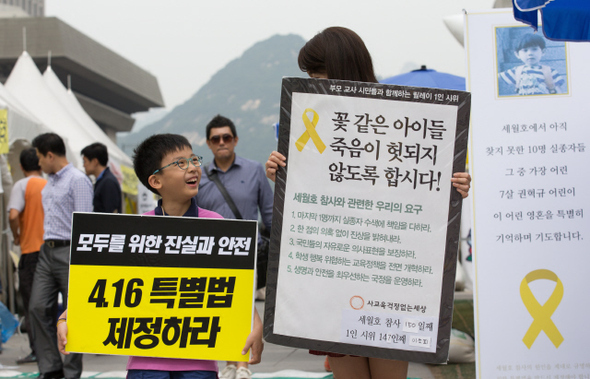 |
| A family assembles to demand a "safe world for my son." |
 |
| President Park participates in mourning the deceased. |
While Sul's accounting of the rumors demonstrate a sexist tendency to focus on the unmarried female President's leadership, they also highlight a sense of betrayal and mistrust. The gossip centers on what might have kept the President preoccupied specifically for the 7 hour period during the Sewol sinking.
On the other hand, Saenuri party spokesperson Park Dae-chul's statement blurs President Park's public office and private sex life, and are not limited to a discussion of the Sewol sinking, but extend to a general comment about women's sexuality:
“It’s troubling to think what might happen if there are rumors about ‘the President of the Republic of Korea having a tryst’ going around,” Park added. “The Saenuri Party intends to examine a possible complaint against Sul Hoon to the National Assembly Ethics Committee.”
What might happen?
By emphasizing the "Republic of Korea" in his statement, perhaps spokesman Park calls upon tried and tested fear of Korean womens' bodies and sexuality and the national image. He asks, how might Korea look to other nations?
Is the Saenuri Party particularly sensitive to North Korea state media describing President Park as a "crafty prostitute" in thrall to her "pimp" Barack Obama?" Or is Saenuri still unclear what they meant by the election campaign slogan "Prepared Woman President?" The party cultivates an image of a woman's body and sexuality sacrificed as the "mother of the Korean state" and in control in contrast to the womens' bodies the state aggressively polices and regulates.
 |
| Campaign Slogan: Prepared Woman President |
Sources:
Hankyoreh, Opposition lawmaker causes firestorm by referring to president’s “tryst”
Posted on : Sep.13,2014 14:15 KST http://english.hani.co.kr/arti/english_edition/e_national/655017.html


.jpg)





